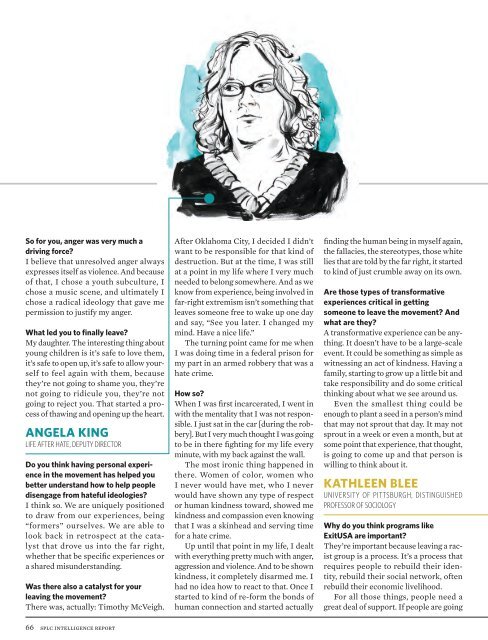Create successful ePaper yourself
Turn your PDF publications into a flip-book with our unique Google optimized e-Paper software.
So for you, anger was very much a<br />
driving force?<br />
I believe that unresolved anger always<br />
expresses itself as violence. And because<br />
of that, I chose a youth subculture, I<br />
chose a music scene, and ultimately I<br />
chose a radical ideology that gave me<br />
permission to justify my anger.<br />
What led you to finally leave?<br />
My daughter. The interesting thing about<br />
young children is it’s safe to love them,<br />
it’s safe to open up, it’s safe to allow yourself<br />
to feel again with them, because<br />
they’re not going to shame you, they’re<br />
not going to ridicule you, they’re not<br />
going to reject you. That started a process<br />
of thawing and opening up the heart.<br />
ANGELA K<strong>IN</strong>G<br />
LIFE AFTER HATE, DEPUTY DIRECTOR<br />
Do you think having personal experience<br />
in the movement has helped you<br />
better understand how to help people<br />
disengage from hateful ideologies?<br />
I think so. We are uniquely positioned<br />
to draw from our experiences, being<br />
“formers” ourselves. We are able to<br />
look back in retrospect at the catalyst<br />
that drove us into the far right,<br />
whether that be specific experiences or<br />
a shared misunderstanding.<br />
Was there also a catalyst for your<br />
leaving the movement?<br />
There was, actually: Timothy McVeigh.<br />
After Oklahoma City, I decided I didn’t<br />
want to be responsible for that kind of<br />
destruction. But at the time, I was still<br />
at a point in my life where I very much<br />
needed to belong somewhere. And as we<br />
know from experience, being involved in<br />
far-right extremism isn’t something that<br />
leaves someone free to wake up one day<br />
and say, “See you later. I changed my<br />
mind. Have a nice life.”<br />
The turning point came for me when<br />
I was doing time in a federal prison for<br />
my part in an armed robbery that was a<br />
hate crime.<br />
How so?<br />
When I was first incarcerated, I went in<br />
with the mentality that I was not responsible.<br />
I just sat in the car [during the robbery].<br />
But I very much thought I was going<br />
to be in there fighting for my life every<br />
minute, with my back against the wall.<br />
The most ironic thing happened in<br />
there. Women of color, women who<br />
I never would have met, who I never<br />
would have shown any type of respect<br />
or human kindness toward, showed me<br />
kindness and compassion even knowing<br />
that I was a skinhead and serving time<br />
for a hate crime.<br />
Up until that point in my life, I dealt<br />
with everything pretty much with anger,<br />
aggression and violence. And to be shown<br />
kindness, it completely disarmed me. I<br />
had no idea how to react to that. Once I<br />
started to kind of re-form the bonds of<br />
human connection and started actually<br />
finding the human being in myself again,<br />
the fallacies, the stereotypes, those white<br />
lies that are told by the far right, it started<br />
to kind of just crumble away on its own.<br />
Are those types of transformative<br />
experiences critical in getting<br />
someone to leave the movement? And<br />
what are they?<br />
A transformative experience can be anything.<br />
It doesn’t have to be a large-scale<br />
event. It could be something as simple as<br />
witnessing an act of kindness. Having a<br />
family, starting to grow up a little bit and<br />
take responsibility and do some critical<br />
thinking about what we see around us.<br />
Even the smallest thing could be<br />
enough to plant a seed in a person’s mind<br />
that may not sprout that day. It may not<br />
sprout in a week or even a month, but at<br />
some point that experience, that thought,<br />
is going to come up and that person is<br />
willing to think about it.<br />
KATHLEEN BLEE<br />
UNIVERSITY OF PITTSBURGH, DIST<strong>IN</strong>GUISHED<br />
PROFESSOR OF SOCIOLOGY<br />
Why do you think programs like<br />
ExitUSA are important?<br />
They’re important because leaving a racist<br />
group is a process. It’s a process that<br />
requires people to rebuild their identity,<br />
rebuild their social network, often<br />
rebuild their economic livelihood.<br />
For all those things, people need a<br />
great deal of support. If people are going<br />
66 splc intelligence report


